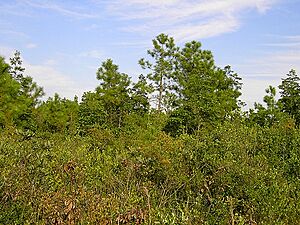Tuckahoe Bay facts for kids
Quick facts for kids Tuckahoe Bay |
|
|---|---|
| Location | South Carolina, USA |
| Nearest city | Myrtle Beach, SC |
| Area | 91 acres (37 ha) |
| Governing body | U.S. Army Corps of Engineers |

Tuckahoe Bay is a special natural area found in Horry County, South Carolina. It is a type of wetland called a Carolina bay. Imagine a swamp, but shaped like a perfect oval – that's what a Carolina bay looks like!
This bay is located near the Covington Lake and Waterford Plantation neighborhoods, which are part of the Carolina Forest area in Myrtle Beach, South Carolina. One interesting thing about Tuckahoe Bay is that the plants, also known as flora, growing there are much shorter than the plants in the areas around it. This happens because the soil inside the bay is different. Tuckahoe Bay has a type of soil called Jo soil, or Johnston Loam, which affects how tall plants can grow.
What is a Carolina Bay?
Carolina bays are unique, oval-shaped wetlands found mostly along the Atlantic coast of the United States. Scientists are still studying exactly how they formed, but many believe they were created by ancient meteor impacts or strong winds and water over thousands of years. These bays are important habitats for many different plants and animals.
The History of Tuckahoe Bay
The name 'Tuckahoe' comes from a Native-American word. This word is often linked to plants, especially those that can be eaten. We don't know for sure how Tuckahoe Bay got its name, but it was probably named by someone who lived in Horry County a long time ago.
The first time the name 'Tuckahoe Bay' appeared on a map was in October 1845. This map was drawn by Cornelius B. Sarvis. It showed a large area that included Socastee Swamp, covering about 5,760 acres.
Tuckahoe Bay has been shown on many different kinds of maps over the years. Some of these maps go all the way back to 1938. In the early 1930s, a company called Ocean Forest Company took pictures of the area from an airplane. These early aerial maps showed what Carolina bays looked like before many buildings were built around them. Even though there are now many homes and developments nearby, Tuckahoe Bay itself has remained mostly untouched and natural.
 | Kyle Baker |
 | Joseph Yoakum |
 | Laura Wheeler Waring |
 | Henry Ossawa Tanner |


